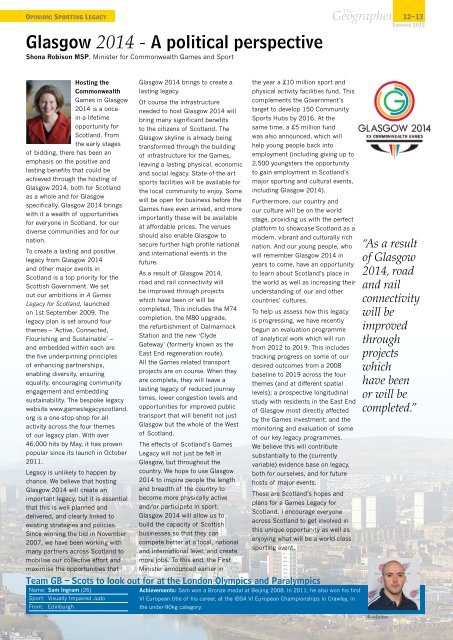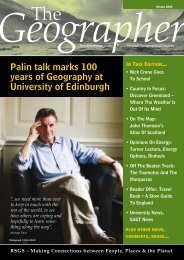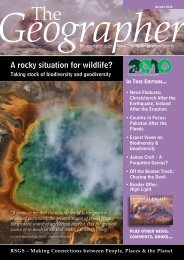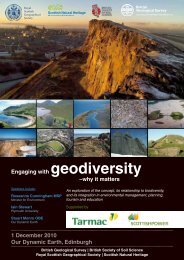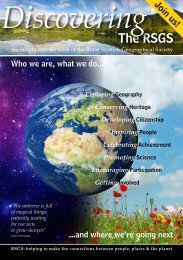Summer - Royal Scottish Geographical Society
Summer - Royal Scottish Geographical Society
Summer - Royal Scottish Geographical Society
Create successful ePaper yourself
Turn your PDF publications into a flip-book with our unique Google optimized e-Paper software.
Opinion: Sporting Legacy<br />
Glasgow 2014 - A political perspective<br />
Shona Robison MSP, Minister for Commonwealth Games and Sport<br />
The<br />
Geographer 12-13<br />
<strong>Summer</strong> 2012<br />
Hosting the<br />
Commonwealth<br />
Games in Glasgow<br />
2014 is a oncein-a-lifetime<br />
opportunity for<br />
Scotland. From<br />
the early stages<br />
of bidding, there has been an<br />
emphasis on the positive and<br />
lasting benefits that could be<br />
achieved through the hosting of<br />
Glasgow 2014, both for Scotland<br />
as a whole and for Glasgow<br />
specifically. Glasgow 2014 brings<br />
with it a wealth of opportunities<br />
for everyone in Scotland, for our<br />
diverse communities and for our<br />
nation.<br />
To create a lasting and positive<br />
legacy from Glasgow 2014<br />
and other major events in<br />
Scotland is a top priority for the<br />
<strong>Scottish</strong> Government. We set<br />
out our ambitions in A Games<br />
Legacy for Scotland, launched<br />
on 1st September 2009. The<br />
legacy plan is set around four<br />
themes – ‘Active, Connected,<br />
Flourishing and Sustainable’ –<br />
and embedded within each are<br />
the five underpinning principles<br />
of enhancing partnerships,<br />
enabling diversity, ensuring<br />
equality, encouraging community<br />
engagement and embedding<br />
sustainability. The bespoke legacy<br />
website www.gameslegacyscotland.<br />
org is a one-stop-shop for all<br />
activity across the four themes<br />
of our legacy plan. With over<br />
46,000 hits by May, it has proven<br />
popular since its launch in October<br />
2011.<br />
Legacy is unlikely to happen by<br />
chance. We believe that hosting<br />
Glasgow 2014 will create an<br />
important legacy, but it is essential<br />
that this is well planned and<br />
delivered, and clearly linked to<br />
existing strategies and policies.<br />
Since winning the bid in November<br />
2007, we have been working with<br />
many partners across Scotland to<br />
mobilise our collective effort and<br />
maximise the opportunities that<br />
Glasgow 2014 brings to create a<br />
lasting legacy.<br />
Of course the infrastructure<br />
needed to host Glasgow 2014 will<br />
bring many significant benefits<br />
to the citizens of Scotland. The<br />
Glasgow skyline is already being<br />
transformed through the building<br />
of infrastructure for the Games,<br />
leaving a lasting physical, economic<br />
and social legacy. State-of-the-art<br />
sports facilities will be available for<br />
the local community to enjoy. Some<br />
will be open for business before the<br />
Games have even arrived, and more<br />
importantly these will be available<br />
at affordable prices. The venues<br />
should also enable Glasgow to<br />
secure further high profile national<br />
and international events in the<br />
future.<br />
As a result of Glasgow 2014,<br />
road and rail connectivity will<br />
be improved through projects<br />
which have been or will be<br />
completed. This includes the M74<br />
completion, the M80 upgrade,<br />
the refurbishment of Dalmarnock<br />
Station and the new ‘Clyde<br />
Gateway’ (formerly known as the<br />
East End regeneration route).<br />
All the Games-related transport<br />
projects are on course. When they<br />
are complete, they will leave a<br />
lasting legacy of reduced journey<br />
times, lower congestion levels and<br />
opportunities for improved public<br />
transport that will benefit not just<br />
Glasgow but the whole of the West<br />
of Scotland.<br />
The effects of Scotland’s Games<br />
Legacy will not just be felt in<br />
Glasgow, but throughout the<br />
country. We hope to use Glasgow<br />
2014 to inspire people the length<br />
and breadth of the country to<br />
become more physically active<br />
and/or participate in sport.<br />
Glasgow 2014 will allow us to<br />
build the capacity of <strong>Scottish</strong><br />
businesses so that they can<br />
compete better at a local, national<br />
and international level, and create<br />
more jobs. To this end, the First<br />
Minister announced earlier in<br />
the year a £10 million sport and<br />
physical activity facilities fund. This<br />
complements the Government’s<br />
target to develop 150 Community<br />
Sports Hubs by 2016. At the<br />
same time, a £5 million fund<br />
was also announced, which will<br />
help young people back into<br />
employment (including giving up to<br />
2,500 youngsters the opportunity<br />
to gain employment in Scotland’s<br />
major sporting and cultural events,<br />
including Glasgow 2014).<br />
Furthermore, our country and<br />
our culture will be on the world<br />
stage, providing us with the perfect<br />
platform to showcase Scotland as a<br />
modern, vibrant and culturally rich<br />
nation. And our young people, who<br />
will remember Glasgow 2014 in<br />
years to come, have an opportunity<br />
to learn about Scotland’s place in<br />
the world as well as increasing their<br />
understanding of our and other<br />
countries’ cultures.<br />
To help us assess how this legacy<br />
is progressing, we have recently<br />
begun an evaluation programme<br />
of analytical work which will run<br />
from 2012 to 2019. This includes<br />
tracking progress on some of our<br />
desired outcomes from a 2008<br />
baseline to 2019 across the four<br />
themes (and at different spatial<br />
levels); a prospective longitudinal<br />
study with residents in the East End<br />
of Glasgow most directly affected<br />
by the Games investment; and the<br />
monitoring and evaluation of some<br />
of our key legacy programmes.<br />
We believe this will contribute<br />
substantially to the (currently<br />
variable) evidence base on legacy,<br />
both for ourselves, and for future<br />
hosts of major events.<br />
These are Scotland’s hopes and<br />
plans for a Games Legacy for<br />
Scotland. I encourage everyone<br />
across Scotland to get involved in<br />
this unique opportunity as well as<br />
enjoying what will be a world-class<br />
sporting event.<br />
Team GB – Scots to look out for at the London Olympics and Paralympics<br />
Name: Sam Ingram (26)<br />
Sport: Visually Impaired Judo<br />
From: Edinburgh<br />
Achievements: Sam won a Bronze medal at Beijing 2008. In 2011, he also won his first<br />
VI European title of his career, at the IBSA VI European Championships in Crawley, in<br />
the under-90kg category.<br />
“As a result<br />
of Glasgow<br />
2014, road<br />
and rail<br />
connectivity<br />
will be<br />
improved<br />
through<br />
projects<br />
which<br />
have been<br />
or will be<br />
completed.”<br />
© onEdition


